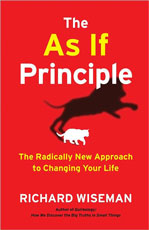"And it isn't just hip-hop dancing that makes you feel good. Peter Lovatt, a colleague of mine at the University of Hertfordshire, carries out research into dance. Labeled 'Dr. Dance' by the British media, Peter has examined a wide range of dance-related issues, including whether people with symmetrical bodies are better dancers (they are) and why fathers dancing at weddings make us cringe (they have an overinflated opinion of their abilities). A few years ago, Peter ran a ten-week experiment examining the effects of dance on mood. Each week he gathered together a group of willing volunteers at the university, taught them a new type of dance, and then asked them to rate their mood. From the foxtrot to flamenco, and salsa to swing, everyone had a jolly time. Once again, the results revealed that behaving as if they were happy made the participants feel better, with dances that were noncompetitive and with an easily learned repetitive structure, such as Scottish country dances and line dancing, proving especially effective.
"If you have two left feet, worry not: you can always sing a happy song. The seventeenth-century Spanish novelist and poet Miguel de Cervantes thought so, noting, 'He who sings frightens away his ills.' But was Cervantes correct?
"Musicologist Grenville Hancox from Canterbury Christ Church University is a world-class clarinet player, conductor, and researcher. Curious about the effect that music has on people, Hancox has carried out several large-scale investigations into whether singing makes people happy, including one study in which he interviewed more than five hundred choral singers. The work has revealed one clear finding: singing makes people feel happy.
"Gunter Kreutz from the J. W. Goethe-Universität in Frankfurt had tackled the same issue under more rigorous circumstances. Kreutz visited a choir during its rehearsal, asked the choristers to sing sections from Mozart's Requiem, and then had them rate how happy they were. As a control, Kreutz again gate-crashed their rehearsal a week later, asked them to listen to a recording of the same piece, and had them again rate their happiness. Although listening to the music didn't make people feel any happier, singing made them feel far more cheerful.
"The message from research into the As If principle and the fun factory is clear: rather than trying to cheer yourself up by thinking happy thoughts, it is far quicker and more effective to simply behave as if you are having a good time. Smile, put a spring in your step, hold your head up high, use happy talk, dance, laugh, sing, or do whatever else you enjoy doing.
"Or, to put it another way, if you want to be happy and you know it, clap your hands."
